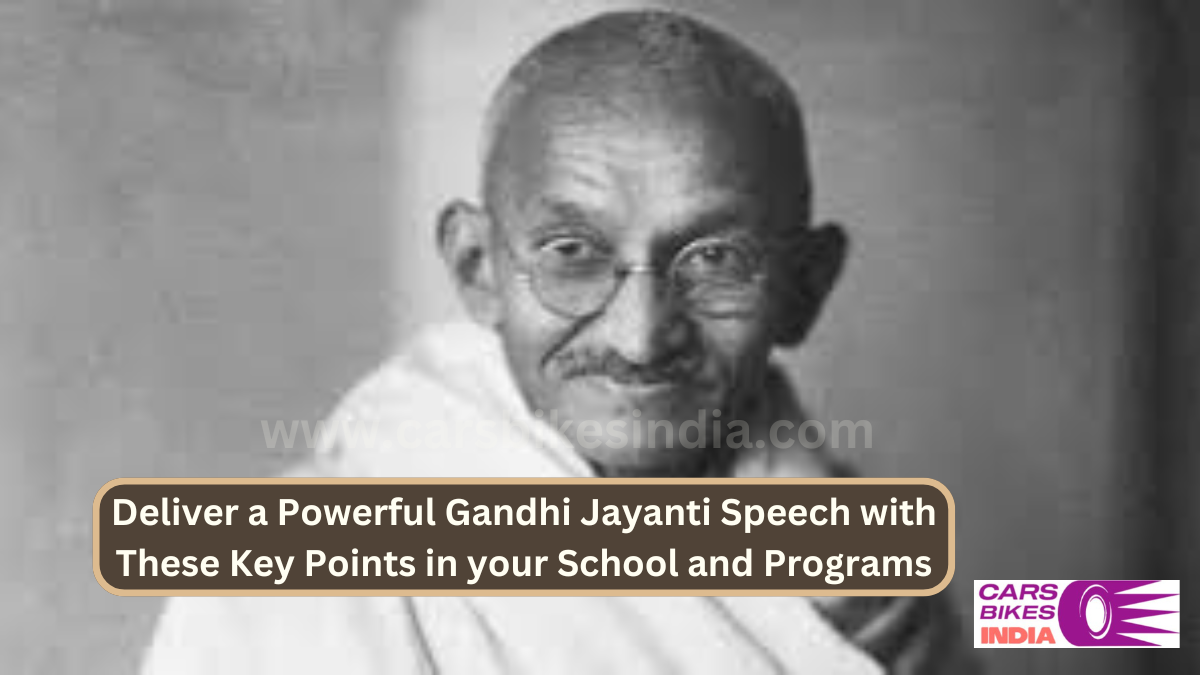Gandhi Jayanti, celebrated on October 2nd, marks the birth anniversary of Mahatma Gandhi, the Father of the Nation. It is a day to honor his legacy, teachings, and contributions to India’s independence and humanity. Whether you are a student, a teacher, or a speaker, delivering an impactful “Gandhi Jayanti speech” is a meaningful way to pay tribute to Mahatma Gandhi’s values of truth, non-violence, and simplicity. This article provides you with key points to help you deliver a powerful and inspiring speech on this special occasion.

Introduction to Gandhi Jayanti
Begin your “Gandhi Jayanti speech” by providing a brief introduction to Gandhi Jayanti and why it is celebrated. Emphasize the importance of October 2nd, which is observed as a national holiday in India and recognized worldwide as the International Day of Non-Violence. Set the context by sharing how Mahatma Gandhi’s life and work have inspired not only India but also people around the globe.
Key Points:
- Gandhi Jayanti is celebrated on October 2nd every year.
- It is a tribute to Mahatma Gandhi, who played a pivotal role in India’s independence.
- The day is also recognized globally as the International Day of Non-Violence.
Early Life of Mahatma Gandhi
Gandhi Jayanti speech : To provide a deeper understanding of Gandhi’s journey, include some details about his early life. Talk about his birth in Porbandar, Gujarat, his upbringing, and his education in law in London. This helps the audience relate to the human side of Gandhi before he became a symbol of non-violence and freedom.
Key Points:
- Born on October 2, 1869, in Porbandar, Gujarat.
- Studied law in London and later went to South Africa, where he began his fight against racial discrimination.
- Gandhi’s experiences in South Africa shaped his philosophy of Satyagraha (truth and non-violence).
Gandhi’s Principles: Truth and Non-Violence
One of the most important aspects of a “Gandhi Jayanti speech” is to discuss Gandhi’s core principles of truth (Satya) and non-violence (Ahimsa). These values formed the foundation of his philosophy and were the guiding forces behind his movements for justice and freedom.
Key Points:
- Truth (Satya): Gandhi believed in the power of truth and that individuals should always be truthful, even in the face of adversity.
- Non-Violence (Ahimsa): He advocated for non-violence as the most powerful weapon against oppression. Ahimsa was not just a strategy but a way of life for him.
- Gandhi used these principles during his struggle against the British colonial rule, inspiring millions to join the freedom movement.
Role in India’s Independence Movement
Highlighting Mahatma Gandhi’s role in the Indian independence movement is crucial in a “Gandhi Jayanti speech.” Mention his leadership in iconic movements like the Non-Cooperation Movement, the Salt March, and the Quit India Movement, which brought the nation together in the fight for freedom.
Key Points:
- Non-Cooperation Movement (1920-1922): Gandhi launched this movement to encourage Indians to boycott British goods, institutions, and services as a form of protest.
- Dandi March (Salt March) in 1930: A significant act of civil disobedience where Gandhi marched 240 miles to the Arabian Sea to protest the salt tax imposed by the British.
- Quit India Movement (1942): A mass protest demanding an end to British rule in India. Gandhi’s call for “Do or Die” inspired people to take a firm stand against colonial oppression.
Gandhi’s Vision for India
A powerful “Gandhi Jayanti speech” should also include Gandhi’s vision for India and his aspirations for the country. Gandhi dreamt of an India free from caste discrimination, where people of all religions lived in harmony, and everyone had access to basic necessities.
Key Points:
- Gandhi envisioned an India that was free, united, and inclusive of all communities.
- He fought against untouchability and worked for the upliftment of marginalized communities.
- His idea of ‘Gram Swaraj’ (village self-rule) emphasized the importance of rural development and self-sufficiency.
Gandhi’s Relevance Today
A crucial aspect of a memorable Gandhi Jayanti speech is to discuss why Gandhi’s teachings are still relevant today. Draw parallels between Gandhi’s values and the current global challenges. Talk about the importance of non-violence in the face of increasing conflicts, the need for sustainable living, and the power of truth in our everyday lives.
Key Points:
- Non-Violence and Peace: In a world still rife with conflict, Gandhi’s principle of non-violence can be a guiding force for peaceful resolutions.
- Sustainable Living: Gandhi’s emphasis on simple living and reducing material wants aligns with the modern concept of sustainable living and environmental responsibility.
- Social Equality: Gandhi’s vision of an inclusive society is still relevant as the world continues to fight against discrimination and inequality.
Gandhi’s Legacy
Conclude your “Gandhi Jayanti speech” by speaking about Gandhi’s lasting legacy. Mention how his teachings have inspired world leaders like Nelson Mandela, Martin Luther King Jr., and many others. Gandhi’s impact on the fight for justice and freedom is truly global, making his life an inspiration for countless movements across the world.
Key Points:
- Gandhi inspired several leaders worldwide, including Martin Luther King Jr. and Nelson Mandela.
- His philosophy of non-violence has become a guiding principle for many social justice movements.
- Gandhi’s legacy continues to inspire millions to live by the values of truth, non-violence, and compassion.
Conclusion
To end your speech, reiterate the importance of celebrating Gandhi Jayanti not just as a remembrance of a great leader, but as an opportunity to reflect on and apply Gandhi’s teachings in our lives. Urge the audience to embrace Gandhi’s values of peace, compassion, and truth in their everyday actions.
Key Points:
- Gandhi Jayanti is a day to celebrate Mahatma Gandhi’s enduring legacy and teachings.
- Encourage the audience to apply the values of truth, non-violence, and compassion in their lives.
- Mahatma Gandhi’s life is an inspiration for us all to make a positive difference in the world.
Tips for Delivering an Effective Gandhi Jayanti Speech
- Know Your Audience: Tailor the content and delivery style based on your audience, whether they are students, teachers, or community members.
- Use Quotes: Incorporate famous quotes by Mahatma Gandhi to add weight to your points, such as “Be the change that you wish to see in the world.”
- Be Passionate: Speak with passion and conviction to truly honor Gandhi’s legacy.
- Keep It Simple and Clear: Gandhi’s philosophy was simple and accessible, and your speech should reflect the same clarity and simplicity.

